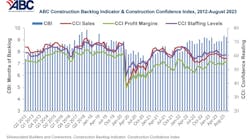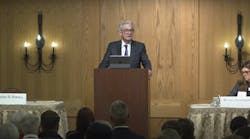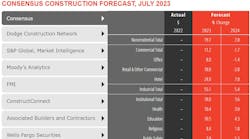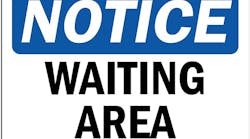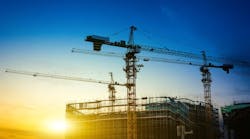With fuel prices inching downward nationally since mid-June, unemployment remaining low and overall construction project data keeping steady, debate is growing over the presumed inevitability of a predicted U.S. economic recession triggered by record inflation and global supply chain woes.
"We don't want to talk ourselves into a recession," cautioned U.S. Commerce Secretary Gina Raimondo, speaking July 10 to ABC News. "The fundamentals of this economy are very strong... I don't see any reason to think that we will have a serious recession."
On July 11, St. Louis Federal Reserve Bank President James Bullard echoed those sentiments, telling Associated Press that he saw little sign of recession on the horizon. Bullard added that he was optimistic the Fed's ongoing series of interest rate hikes, including June's 0.75% boost, would be effective in taming prices.
“Now we have lots of inflation, but the question is, can we get (inflation) back to 2% without disrupting the economy?" Bullard asked. "I think we can."
For its part, the U.S. construction industry so far has weathered the uncertainty. The industry's latest economic measures continue to show resilience, even as worries persist. This week, the Dodge Construction Network's monthly Dodge Momentum Index, which tracks nonresidential building projects in planning, logged a 1% increase in June to reach a 14-year high. This was led by a 4.1% rise in the index's commercial projects component, still driven by the ongoing boom in warehouse construction.
“A new cyclical high in the Momentum Index is a sign that developers feel that projects still have hope of moving forward, despite concerns of an impending economic slowdown," explained Dodge Chief Economist Richard Branch. "However, this sentiment will be tested in the months to come as higher interest rates eat away at business and consumer confidence."
Even so, the construction industry added 13,000 jobs in June, according to the U.S. Bureau of Labor Statistics. But the number of jobseekers with construction experience plunged to a record low for the month, according to an analysis of the new data by the Associated General Contractors of America (AGC).
“Although nonresidential contractors were able to add employees in June, the industry needs more as demand for projects is outpacing the supply of workers,” said AGC Chief Economist Ken Simonson. “With industry unemployment at a record low for June and openings at an all-time high for May, it is clear contractors can’t fill all the positions they would like to.”
The unemployment rate among jobseekers with construction experience tumbled from 7.5% in June 2021 to 3.7% last month, the lowest rate for June in the 23-year history of the data, Simonson noted. The number of unemployed construction workers fell by 345,000, or 47%, to 385,000, suggesting there are few experienced jobseekers left to hire, he added.
“This employment report was a welcome respite from a sea of bad economic news,” said Anirban Basu, chief economist for Associated Builders and Contractors (ABC). “This does nothing, however, to dim the risk of recession. Employment tends to be a lagging indicator. Moreover, the solid employment performance makes it more likely that the Federal Reserve will continue to raise interest rates during the months to come, including this month. Higher borrowing costs working in conjunction with lofty materials prices and rapidly rising worker compensation mean that the threat of significant numbers of project postponements and cancellations remains firmly in place."
On July 12, ABC released the results of its latest Construction Backlog Indicator (CBI) and Construction Confidence Index (CCI), based on monthly surveys of its association members. CBI fell 0.1 months in June and stands at 8.9 months, according to an ABC member survey conducted June 21 to July 5. That reading is up 0.4 months from June 2021.
“Several months ago, there was conjecture that contractors were generally too upbeat regarding their collective future,” said Basu. “Increasingly, the data suggest that they were. At the time, many contractors reported surging backlog and an ability to pass along hefty cost increases to project owners. For months, contractors expected sales, employment and margins to expand. The most recent ABC survey indicates that, to secure work and to induce project starts, a growing fraction of contractors is having to trim margins."
That could explain why the latest CCI readings for sales, profit margins and staffing levels all declined in June, according to ABC. The indices for sales and staffing remain above the threshold of 50, indicating expectations of growth over the next six months, while the reading for profit margins fell below the threshold of 50 for the first time since October 2021.
“In the context of rising fears of recession and rising borrowing costs, the stage has been set for softer nonresidential construction activity going forward," said Basu. "That said, public contractors can expect to remain busy in the context of a significant infrastructure spending package. Still, the market may not prove as robust as anticipated given delayed project start dates as public agencies determine the right moment to purchase construction services. Despite all of these considerations, contractors continue to expect industry sales and employment to expand over the next six months.”
And economists differ widely on the "inevitability" of a recession and the longer term prospects for the U.S. economy, overall.
“The surge in material prices and labor shortages are causing significant project cost hikes and delays, reducing funding available for new projects," noted Jack Riddleston, a construction analyst at London-based GlobalData, which just released the midyear update to its recent report, Global Construction Outlook to 2026. "For example, the initial cost expectation of the Des Moines International Airport terminal expansion was $434 million when it was announced in 2018. However, due to a spike in input costs, the project is now set to cost $733 million, and officials are considering staggering the construction of the project to offset the increase in costs.”
That sobering example explains why GlobalData has cut its North American growth forecast from 4.5% down to 2.4% for 2022. Still, it remains bullish toward 2023.
“The outlook for North America will improve, as inflationary pressures and supply-chain disruptions will likely subside and federal spending from the IIJA (Infrastructure Investment and Jobs Act) will likely be realized in late 2022 and early 2023," added Riddleston. "As a result, GlobalData expects the North American construction sector to grow by 3.7% in 2023.”
If that happens, of course, the "inevitable" recession will have been pushed off for yet another year.
##########

